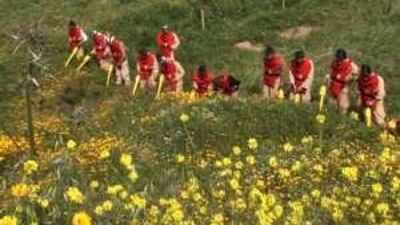NEW YORK // Jawad Metni, an Arab-American film-maker of Lebanese origin, watched from New York the Israeli onslaught against Hizbollah in Lebanon during the summer of 2006 with an overwhelming feeling of helplessness. "I have a lot of family there and it was just devastating," said Mr Metni, who is 38 and grew up in Texas. He closely followed newspaper stories about post-war reconstruction and the massive efforts undertaken to clear the land of cluster bomb munitions, about one million of which were dropped by the Israeli air force. Around 30 per cent failed to detonate and pose a continuing danger to civilian life. Mr Metni felt he could do nothing about the post-war situation, but decided to overcome his sense of impotence and make a film about the people of south Lebanon rebuilding their lives. In 2007, he spent seven months living and filming among them. The result, Remnants of a War, will be shown on June 17 in New York as part of the Human Rights Watch Film Festival, which celebrates its 20th anniversary this year. The film is Mr Metni's first feature-length documentary as a director. It follows a diverse group of men and women de-miners who are Shiite, Sunni and Christian, although their religious and political allegiances are barely mentioned. His budget was US$120,000 (Dh440,640), most of which went towards his living costs and the film's music and editing. There is no narration and the characters speak for themselves about the dangers of the job and their hopes and fears for the future. Mr Metni said in accompanying notes that the film captured a "resilient people rebuilding their lives with humour, grace and humility. I'm blessed to have worked amongst them." Andrea Holley, the deputy director of the film festival, said about 20 films about the Lebanon war were submitted for inclusion before she saw Remnants of a War, which she knew would be screened after viewing just the first 10 minutes. "Unfortunately, we got a lot of films that are just what I call 'running gun footage' with no characters and where you walk away wondering if the film-maker even cares about Lebanon. Some are very graphic and that's not helpful either," she said. "We choose films solely on their quality, not their themes." The film festival is a division of Human Rights Watch, the New York-based group that campaigns and produces reports based on international law to highlight injustices around the world. The festival was conceived as another way to raise awareness of international issues and to celebrate the 60th anniversary of the United Nations Universal Declaration of Human Rights, Ms Holley said. "Human rights can be intellectualised and that's very much the nature of most of the work that we do, but in the end what makes people act are emotions," she said. "At discussions after the screenings, people say they're very appreciative of the fact that film-makers go and spend time in places that they wouldn't necessarily go to, such as Chechnya or Saudi Arabia. People are definitely spurred on to volunteerism by seeing these films." Ms Holley said the quality of the films submitted had evolved to sophisticated levels during the 10 years she had worked for the festival, which receives up to 500 submissions each year. Dramas, documentaries and animated films are eligible. "So many are now shot like feature films, with scores and high production values," she said. "The films sometimes blur the line between documentary and drama because film-makers have become good at almost tricking people into seeing a human rights film." Twenty-one feature-length films and 11 shorts from 17 countries will be screened this month, dealing with issues in countries from Afghanistan to Rwanda. Film subjects are often tied to current affairs although there is often a time lag between big events, such as the 2003 Iraq war, and a finished film given the constraints of access and the necessity to spend time to develop trusted relationships with subjects. Ms Holley said that 20 years ago many films focused on the former Soviet Union or the Holocaust. Films about Latin America tended to come in waves. Asia, particularly China and Myanmar, remained challenging environments, as did Zimbabwe. She said she has noticed a decline in films about the Israeli-Palestinian conflict. Films from the Gulf were also in short supply although she said the Middle East International Film Festival in Abu Dhabi had helped to raise interest in the region. Mr Metni said he still hoped to make a sweeping film explaining Lebanon's tumultuous history to US residents as well as people in the Middle East. Speaking before Lebanon's parliamentary elections yesterday, he said he had little faith in the country's leaders, who all too often were used as pawns by bigger powers. "I would love to spend more time in the country and improve my Arabic," he said. "But making films like this takes a lot out of you." sdevi@thenational.ae

Lebanon's heroes tell their stories
Documentary film-maker focuses on people cleaning up unexploded Israeli cluster bombs in Lebanon speaking of their fears and hopes for the future.
Most popular today
